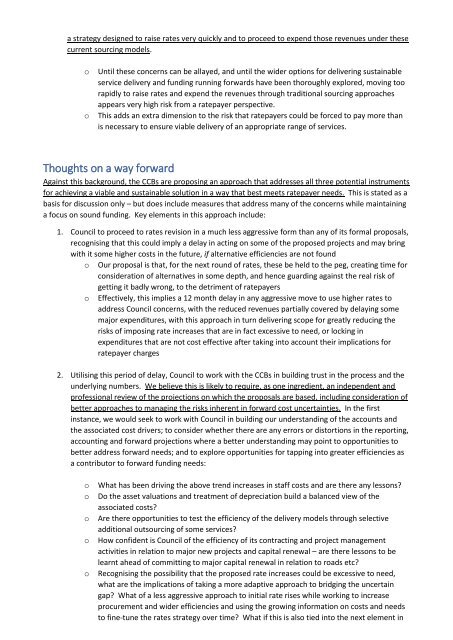Special Rate Variation Community Engagement Report - Shoalhaven City Council
Shoalhaven City Council lodged a formal application to the Independent Pricing and Regulatory Tribunal (IPART) for a Special Rate Variation.
Shoalhaven City Council lodged a formal application to the Independent Pricing and Regulatory Tribunal (IPART) for a Special Rate Variation.
You also want an ePaper? Increase the reach of your titles
YUMPU automatically turns print PDFs into web optimized ePapers that Google loves.
a strategy designed to raise rates very quickly and to proceed to expend those revenues under these<br />
current sourcing models.<br />
o<br />
o<br />
Until these concerns can be allayed, and until the wider options for delivering sustainable<br />
service delivery and funding running forwards have been thoroughly explored, moving too<br />
rapidly to raise rates and expend the revenues through traditional sourcing approaches<br />
appears very high risk from a ratepayer perspective.<br />
This adds an extra dimension to the risk that ratepayers could be forced to pay more than<br />
is necessary to ensure viable delivery of an appropriate range of services.<br />
Thoughts on a way forward<br />
Against this background, the CCBs are proposing an approach that addresses all three potential instruments<br />
for achieving a viable and sustainable solution in a way that best meets ratepayer needs. This is stated as a<br />
basis for discussion only – but does include measures that address many of the concerns while maintaining<br />
a focus on sound funding. Key elements in this approach include:<br />
1. <strong>Council</strong> to proceed to rates revision in a much less aggressive form than any of its formal proposals,<br />
recognising that this could imply a delay in acting on some of the proposed projects and may bring<br />
with it some higher costs in the future, if alternative efficiencies are not found<br />
o Our proposal is that, for the next round of rates, these be held to the peg, creating time for<br />
consideration of alternatives in some depth, and hence guarding against the real risk of<br />
getting it badly wrong, to the detriment of ratepayers<br />
o Effectively, this implies a 12 month delay in any aggressive move to use higher rates to<br />
address <strong>Council</strong> concerns, with the reduced revenues partially covered by delaying some<br />
major expenditures, with this approach in turn delivering scope for greatly reducing the<br />
risks of imposing rate increases that are in fact excessive to need, or locking in<br />
expenditures that are not cost effective after taking into account their implications for<br />
ratepayer charges<br />
2. Utilising this period of delay, <strong>Council</strong> to work with the CCBs in building trust in the process and the<br />
underlying numbers. We believe this is likely to require, as one ingredient, an independent and<br />
professional review of the projections on which the proposals are based, including consideration of<br />
better approaches to managing the risks inherent in forward cost uncertainties. In the first<br />
instance, we would seek to work with <strong>Council</strong> in building our understanding of the accounts and<br />
the associated cost drivers; to consider whether there are any errors or distortions in the reporting,<br />
accounting and forward projections where a better understanding may point to opportunities to<br />
better address forward needs; and to explore opportunities for tapping into greater efficiencies as<br />
a contributor to forward funding needs:<br />
o<br />
o<br />
o<br />
o<br />
o<br />
What has been driving the above trend increases in staff costs and are there any lessons?<br />
Do the asset valuations and treatment of depreciation build a balanced view of the<br />
associated costs?<br />
Are there opportunities to test the efficiency of the delivery models through selective<br />
additional outsourcing of some services?<br />
How confident is <strong>Council</strong> of the efficiency of its contracting and project management<br />
activities in relation to major new projects and capital renewal – are there lessons to be<br />
learnt ahead of committing to major capital renewal in relation to roads etc?<br />
Recognising the possibility that the proposed rate increases could be excessive to need,<br />
what are the implications of taking a more adaptive approach to bridging the uncertain<br />
gap? What of a less aggressive approach to initial rate rises while working to increase<br />
procurement and wider efficiencies and using the growing information on costs and needs<br />
to fine-tune the rates strategy over time? What if this is also tied into the next element in


